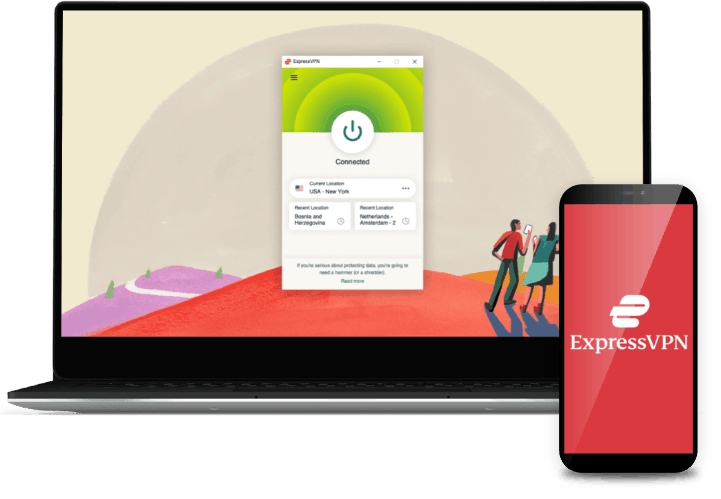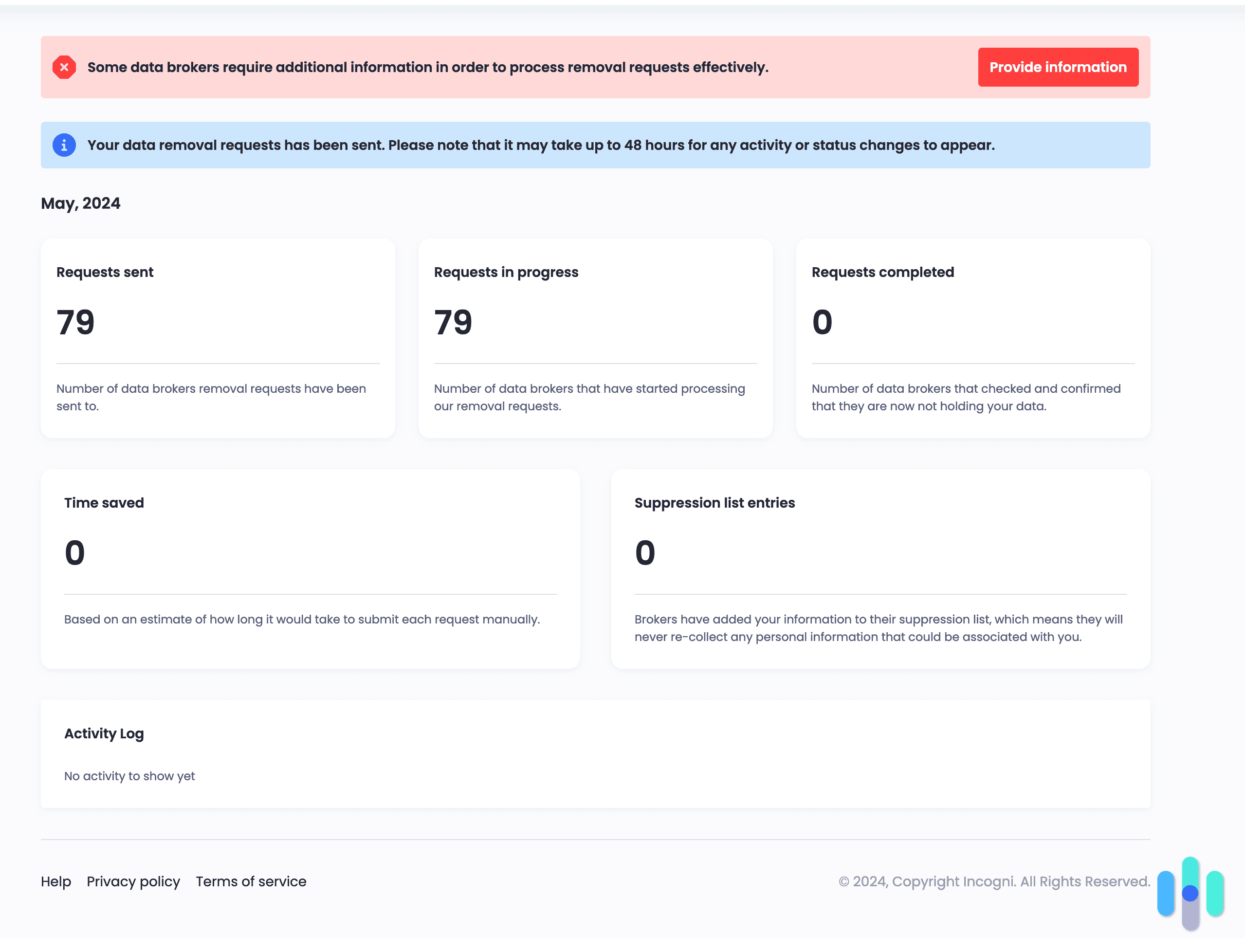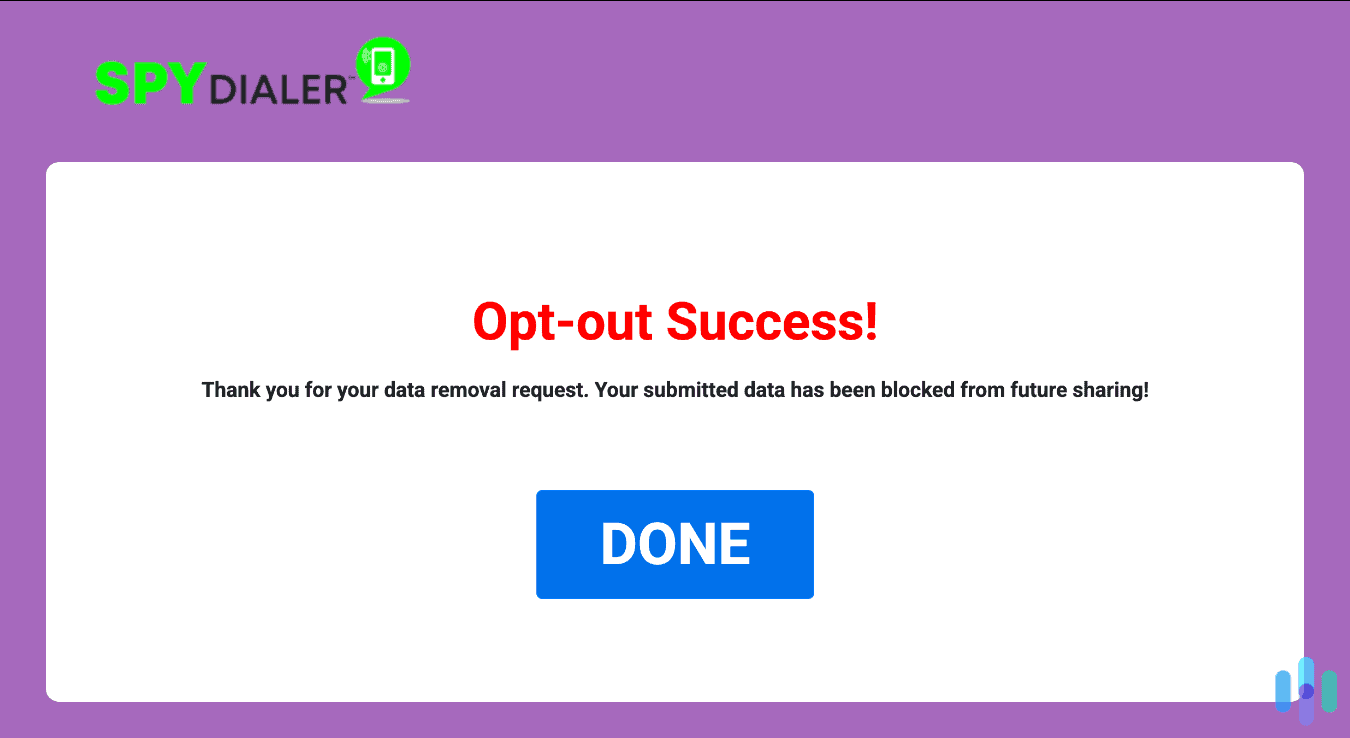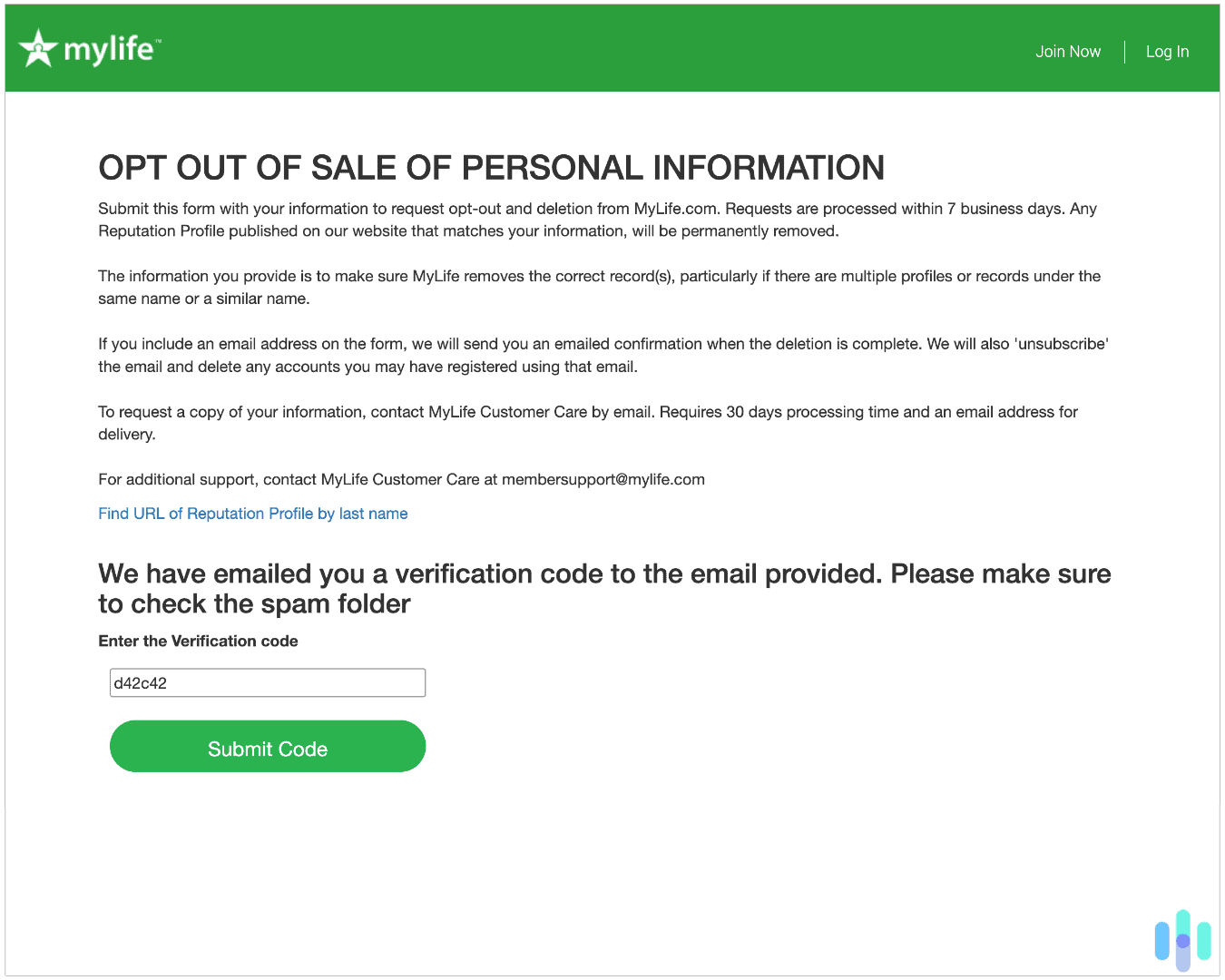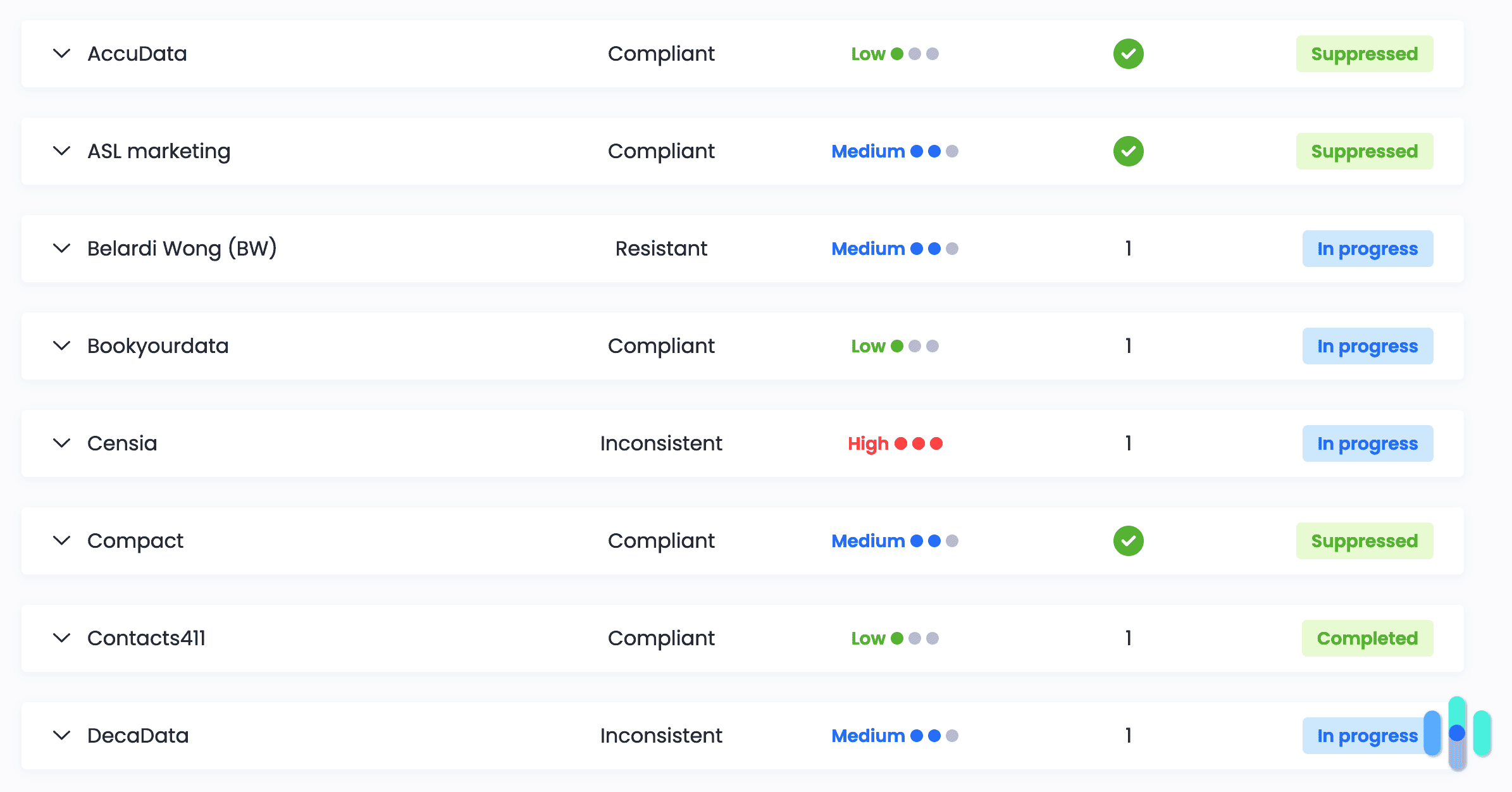ExpressVPN Review
ExpressVPN is one of our favorite VPNs thanks to its high speeds and strict logging policy.
 Aliza Vigderman, Senior Editor, Industry Analyst
&
Aliza Vigderman, Senior Editor, Industry Analyst
&
 Gabe Turner, Chief Editor
Last Updated on Jul 11, 2025
Gabe Turner, Chief Editor
Last Updated on Jul 11, 2025
What We Like
- Company headquarters: Based in the British Virgin Islands, ExpressVPN is free to uphold its no-logs policy and provide anonymous service to users around the world.
- 105 server locations: ExpressVPN has servers in 105 countries, more than any other VPN we tested.
- Apps for different devices: Most VPNs have apps for iOS, Android, Windows, and macOS, but ExpressVPN also has apps for Linux, Apple TV, Fire TV, Android TV, and other less prominent platforms.
What We Don't Like
- Limited simultaneous connections: Under the current ExpressVPN plans, users can connect only up to eight devices at a time. It’s not the most ideal for sharing with family.
- Slow email support: ExpressVPN’s email support took almost two days to answer our query.
- Expensive rates: While the $12.99 monthly rate and $4.99-per-month yearly rate are quite expensive, even the two-year rate of $3.49 per month is higher than most other two-year plans.
Bottom Line
Is ExpressVPN still one of the best VPNs on the market? In our latest round of testing, we liked that ExpressVPN offers over 100 server locations and dozens of user-friendly apps for computers, phones, and streaming devices.
There are few areas for improvement, like its limit on simultaneous connections and lengthy email response time. It’s not exactly the cheapest VPN out there either. Let’s break down ExpressVPN’s pros and cons to see if it’s the VPN for you.
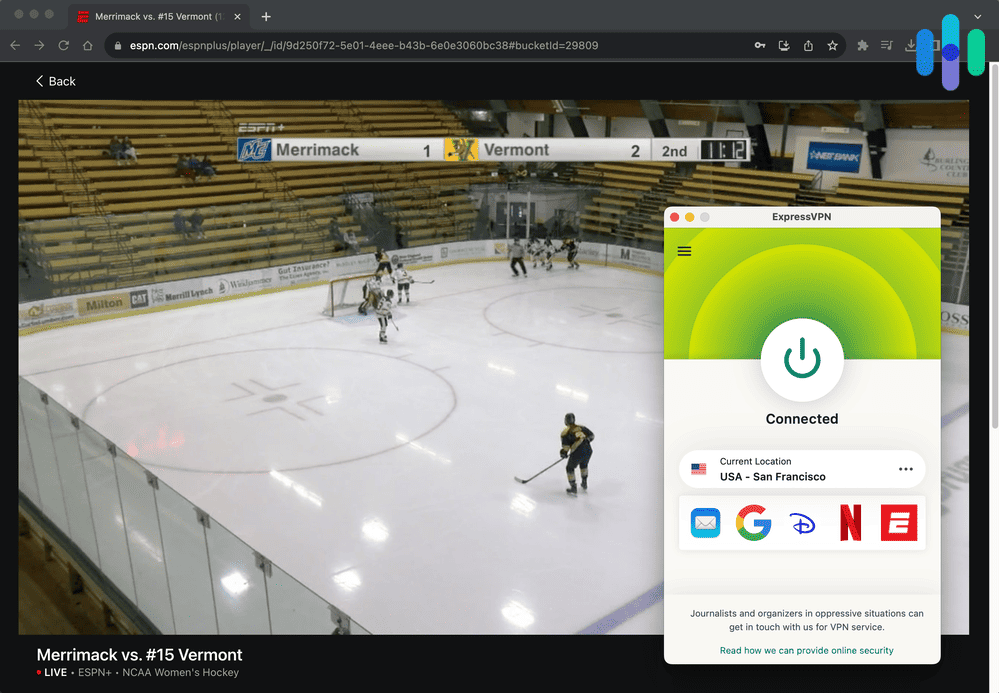
ExpressVPN Quick Stats
| Logs Data | No |
|---|---|
| Kill Switch | Yes |
| Tunneling | Split |
| Netflix | Yes |
| Torrenting | Yes |
| IP Addresses | Anonymous, regularly rotated |
Overall Rating
- Based in British Virgin Islands, so not subject to international surveillance alliances’ jurisdiction
- Over 3,000 servers in 105 locations
- Split tunneling available
How Does ExpressVPN Stack Up?
After thorough testing, we gave ExpressVPN a 9.1 out of 10 rating, thanks largely to its strong and innovative security features. However, we saw its price, device limit, and lack of quality customer support as possible causes for concern, which are why it didn’t make the top three. These VPNs did:
A Look At ExpressVPN Servers
ExpressVPN has over 2,000 RAM servers in 105 countries, which is impressive, but still less than NordVPN’s 7,700+ RAM servers. While you might not need access to 2,000 servers (let alone NordVPN’s 7,700+), it means ExpressVPN can handle traffic from millions of users.
| VPN | Server locations |
|---|---|
| NordVPN | 118 countries |
| ExpressVPN | 105 countries |
| Surfshark | 100 countries |
| CyberGhost | 100 countries |
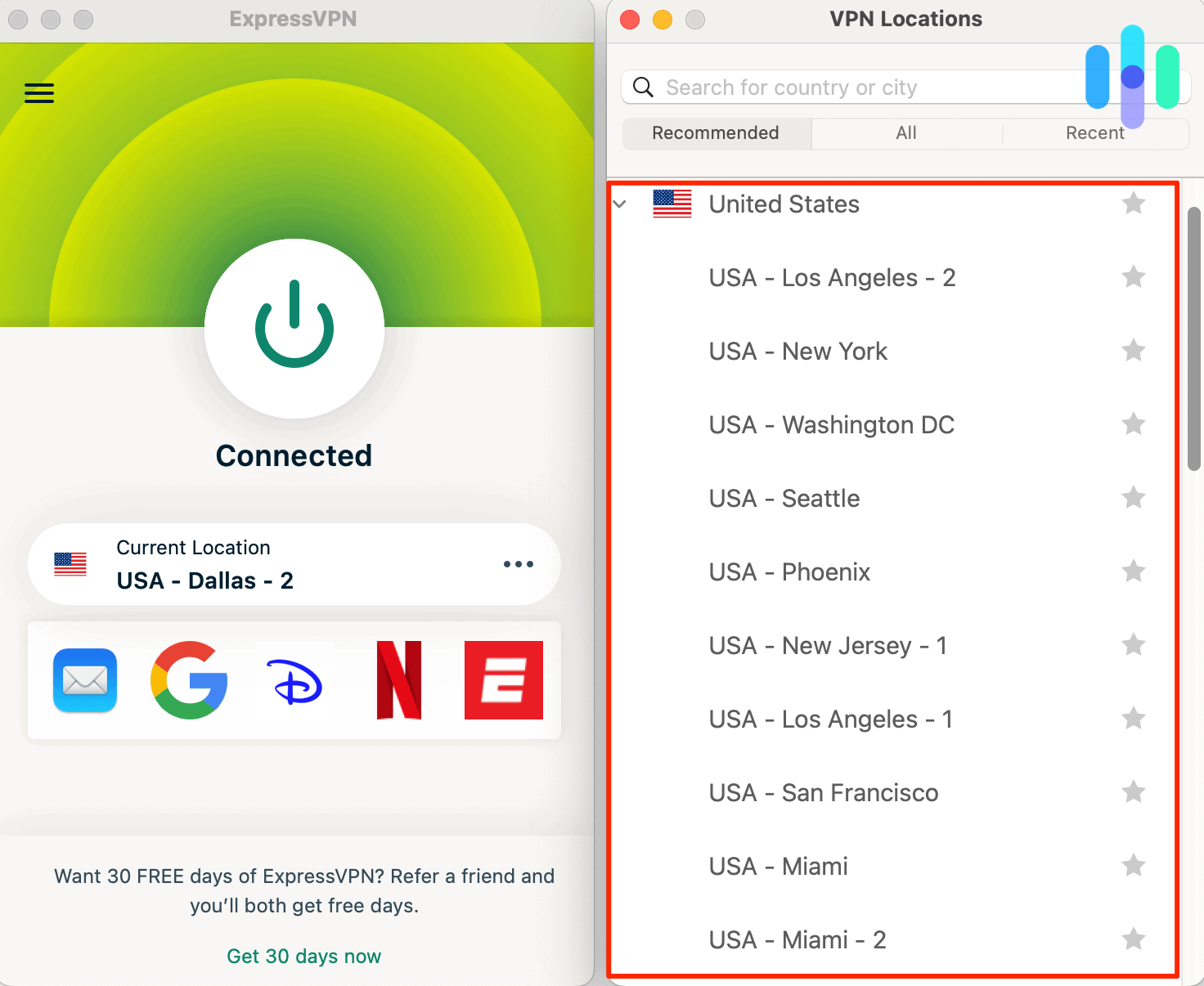
ExpressVPN’s 2000 servers can handle millions of users because each server offers between one and 10 Gbps of bandwidth. Having servers in 105 countries also gives users access to location-specific sites and services. For example, you could change your Netflix region to access content not available in your country. Also, the scope of ExpressVPN’s network makes it one of the best VPNs for domestic and international travel.
>> Learn More: The Top VPNs for Streaming in 2025
ExpressVPN Background Check
In case you didn’t know, the headquarters of a VPN service is critical to protecting your privacy. Express VPN is based in the British Virgin Islands and the government there does not require companies to share the data of their users. By comparison, the United States can compel companies to share user data, and this makes US-based VPN services less trustworthy than express VPN.
FYI: India is a country that requires VPN companies to store user information on their servers. Therefore, ExpressVPN’s India servers are virtually located. This means they can provide India IP addresses but are physically located elsewhere.
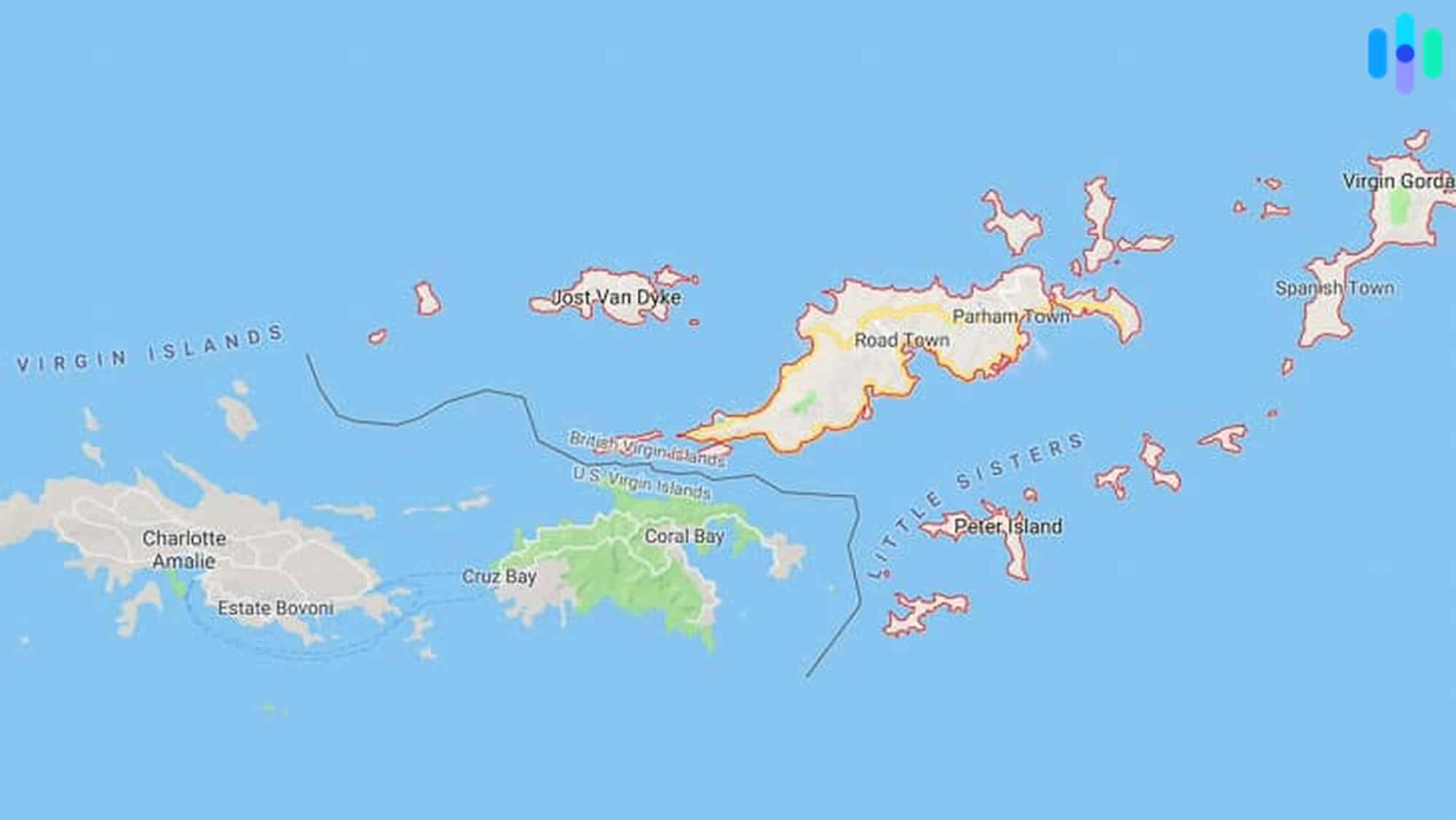
Although it’s based in a safe haven for privacy, ExpressVPN has endured its fair share of controversy. In early September of 2021, Kape Technologies purchased the company for $936 million in one of the largest tech acquisitions in history. Kape began life as Crossrider, a company with a history of producing malware.1 In that same week, the U.S. government revealed that ExpressVPN’s current CIO was previously involved in helping the UAE hack American targets.2
That being said, the company hasn’t been proven of wrongdoing. Our thorough research indicates it continues to maintain high privacy standards and respect in the tech community. It also embraces the best practice of resetting its servers every week. Because these servers are RAM-based, a reset completely wipes all data.
FYI: We like that ExpressVPN is audited by third parties. The last one was completed in February 2025 and verified the TrustedServer System and privacy policy claims.
ExpressVPN also submits its servers, apps, and privacy policy for regular third-party audits. This is an industry best practice, and all of the biggest VPN providers have been audited recently. The most recent ExpressVPN posted to its website is from December 2023. While it would be nice to see something a bit more recent, you should feel comfortable using this service.
ExpressVPN Features
We put ExpressVPN through the ringer by testing it with Wi-Fi and mobile connections. But that’s not all. We even combed through ExpressVPN’s privacy policy to learn more about what data the company logs, read up on the encryption and VPN protocols, and streamed a TV show or two on another country’s streaming service. Here’s what we discovered.
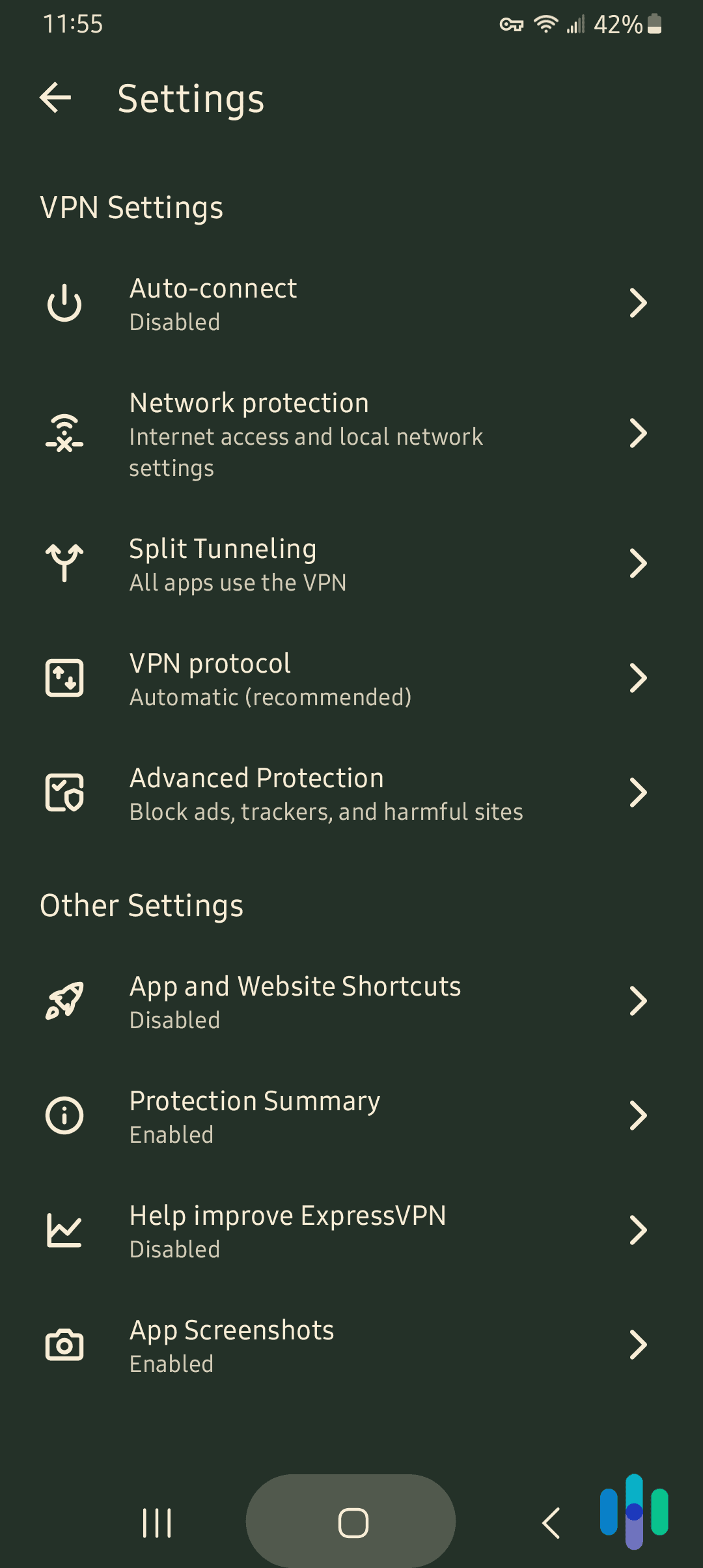
Will ExpressVPN Log My Data?
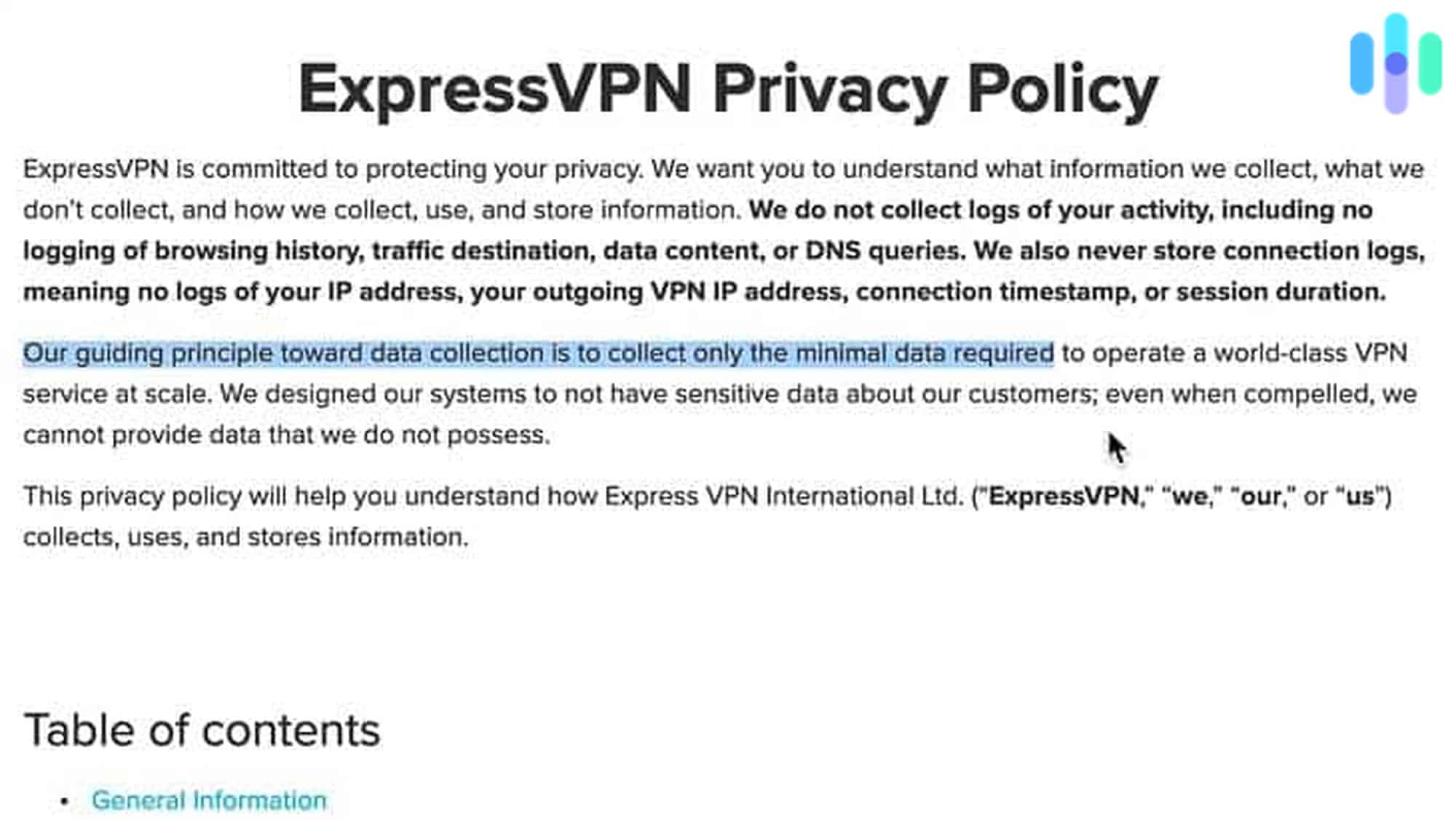
People primarily use VPNs to maintain privacy, browse anonymously, and communicate securely.3 Others choose the best VPN for Netflix catalogs in other countries. ExpressVPN ticks all these boxes, especially when it comes to never logging IP addresses and browsing histories.
Just to be clear, every VPN company captures some level of data so they can continue to improve services. Some of the information ExpressVPN collects are device information, software versions, and bandwidth usage. But this data is unidentifiable. It’s different from Surfshark, which logs your IP address, encrypts the data, and deletes it within 15 minutes of disconnecting from the VPN. ExpressVPN doesn’t capture your IP address at all.
Overall, ExpressVPN’s openness on the types of data it collects gave us confidence that our privacy is safe with its VPN.
Does ExpressVPN Have A Kill Switch?
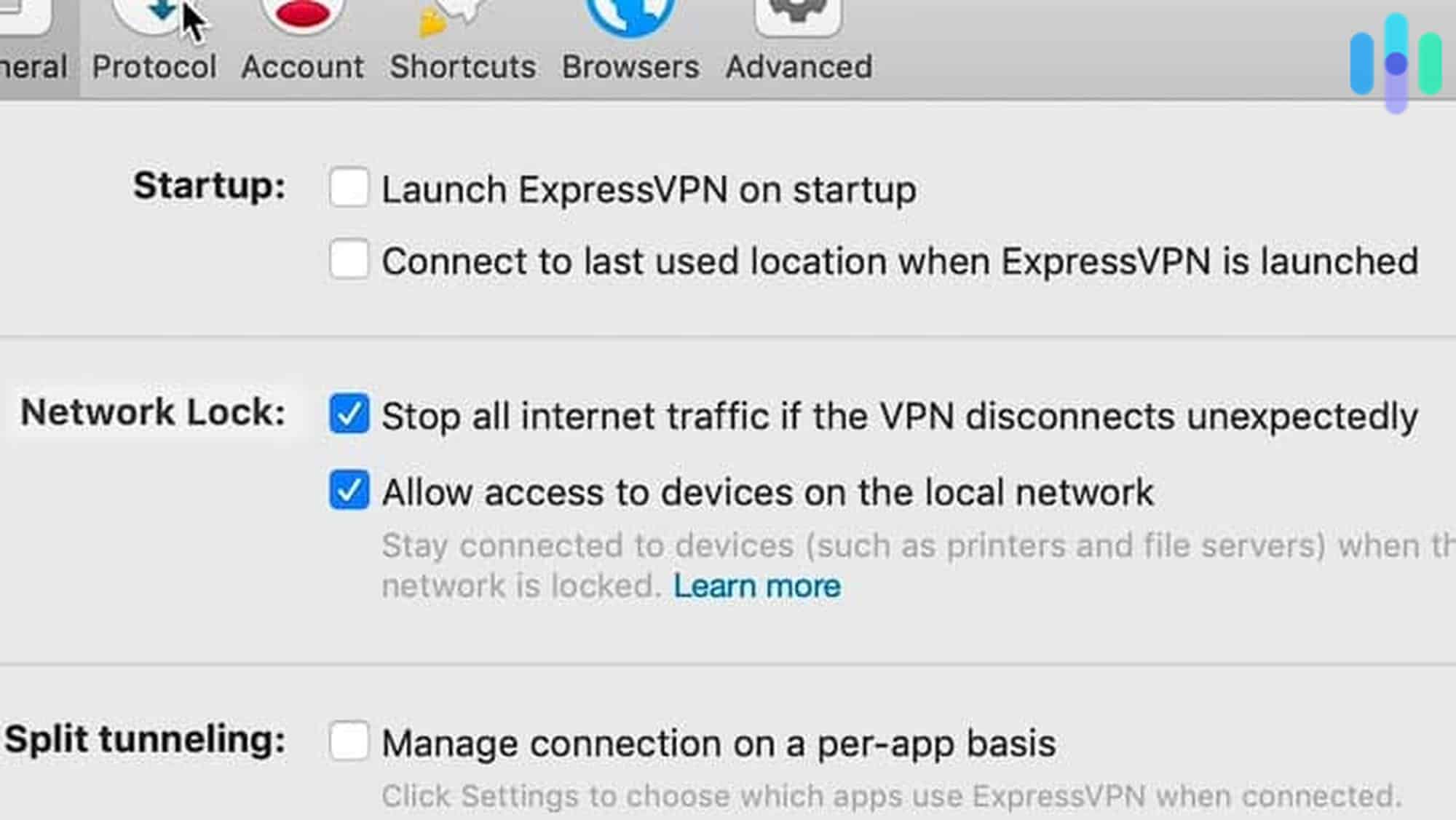
A kill switch is non-negotiable for VPNs. It works by blocking your device’s internet traffic if the connection drops out. Thankfully, ExpressVPN has one.
During our testing, we saw the kill switch in action twice. It disconnected our connection when a server timed out and when we switched networks on a mobile device. But other than these two occasions, our ExpressVPN connection was stable even though we were logged in for an average of 15 hours a day over a month.
What Kind of Tunneling does ExpressVPN Offer?
Another good thing about ExpressVPN is that it allows split tunneling (unless you are running on macOS 11 and above). This feature allows traffic from your device to pass through two types of networks: One is the encrypted VPN network and the other is the normal, unencrypted network.
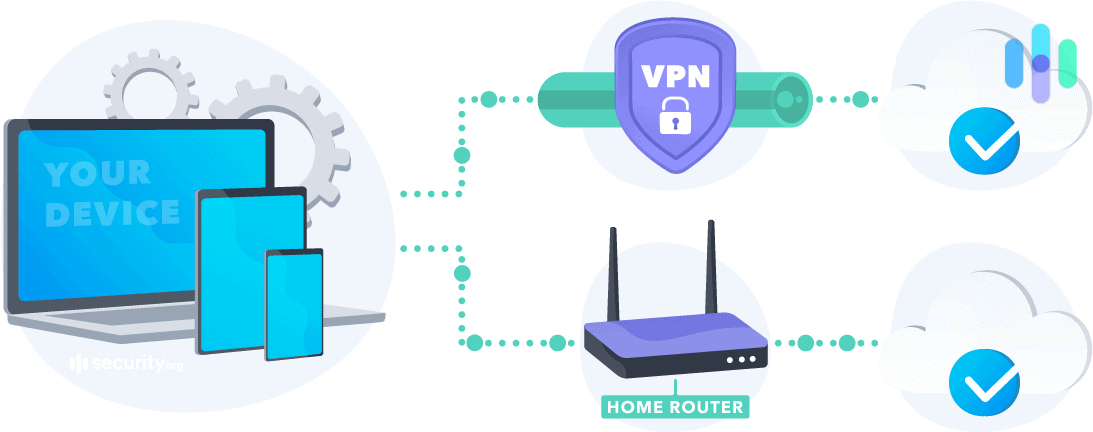
Not all apps and websites love VPNs. We’re looking at you Netflix. But it isn’t just streaming services. Some mobile banking apps block VPN traffic too. This is where split tunneling can be a great solution.
Here’s how it works: Within the VPN app, we choose what apps to run through ExpressVPN and what traffic to direct to our normal internet connection. For example, we selected our banking app to use our normal connection so we could access our cash. But we kept Chrome running via ExpressVPN so our internet traffic remained hidden. This method was better than constantly disconnecting and reconnecting throughout the day when we were switching tasks.
Can I Use Netflix with ExpressVPN?
One of the most popular uses of a VPN is to unblock streaming libraries from all around the globe. For us in the United States, that includes watching Netflix U.K., Australia, Japan, and others. We’re huge TV and movie fans, so we were delighted to find out that ExpressVPN can give us access to Netflix libraries abroad.
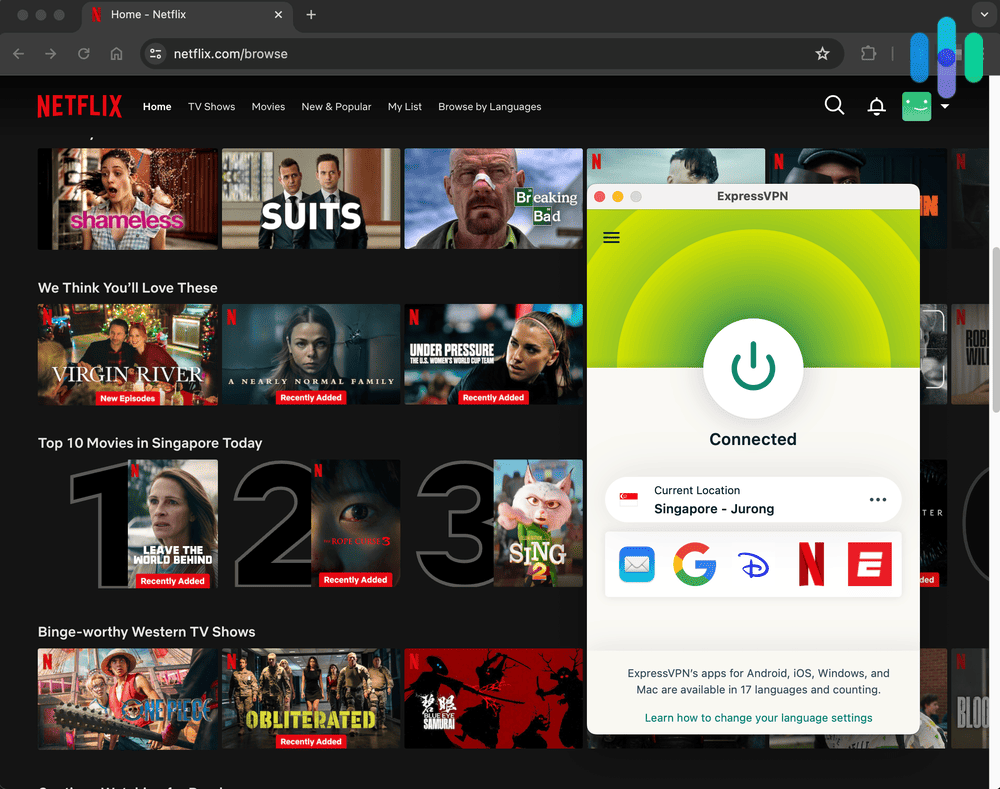
This was where that wide server reach of ExpressVPN proved handy. While there are a lot of good shows on the U.S. Netflix, we learned that the countries with the largest libraries are Slovakia and Bulgaria. Those countries aren’t big and popular so most VPNs don’t have servers in them.
When we tested Total VPN we learned it has servers in just 35 countries – and Slovakia wasn’t one of them. Meanwhile, Express VPN has servers in 105 countries, including Slovakia and Bulgaria. So it was easier to find locations we wanted to connect to.
ExpressVPN Encryption
ExpressVPN used several methods to protect our privacy. It had a private DNS server so we wouldn’t have to use our internet provider’s DNS, rotated our IP address regularly to prevent tracking, and offered encryption to hide the content of our traffic from prying eyes.
That last one, encryption, was the most important. ExpressVPN encrypted our traffic using 256-bit AES, the modern encryption standard the U.S. military uses. It’s the highest encryption available in VPNs, and coupled with ExpressVPN’s efficient traffic delivery protocols a.k.a. VPN protocols, it provided us a smooth but secure experience.
ExpressVPN Protocols
Internet protocols determine how to dispatch data packets across a network. We like to think of the data packets as mail, and protocols as the different routes that mailmen could take. Sure, they could go through the woods and get there quicker, but they might run into a wolf on the way. On the other hand, if they take only major highways, the mail will arrive safely, but perhaps later than it would be going through the woods.
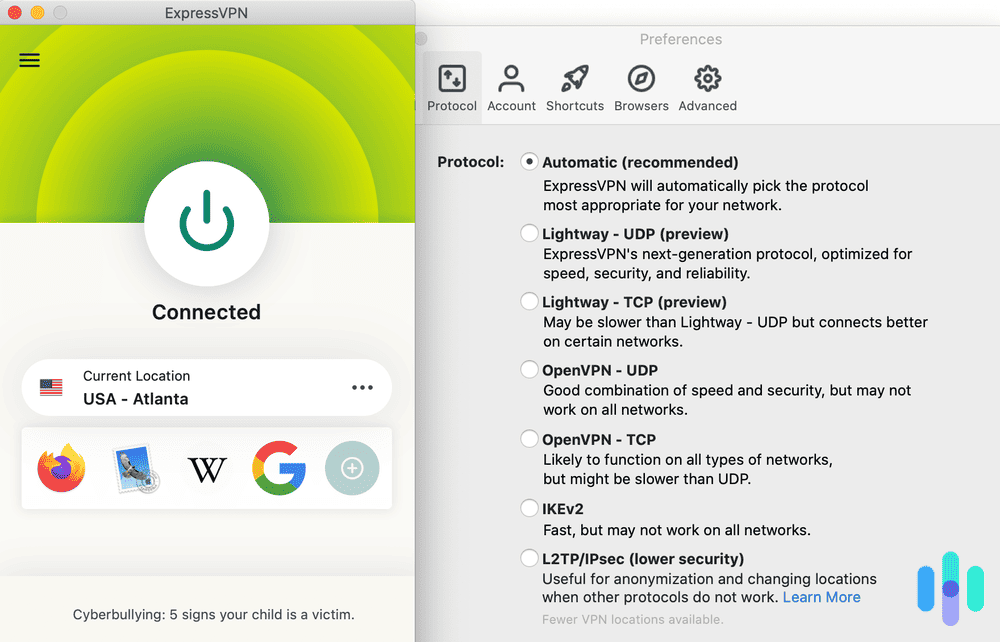
The metaphor holds true for internet protocols, as safe protocols mean a safer, if slower, VPN server. ExpressVPN offers the following VPN protocols:
OpenVPN
OpenVPN is the most popular protocol among VPNs and with good reason. It provides the perfect combination of safety and speed. Plus, OpenVPN offers two separate flavors:
- UDP: UDP, or User Datagram Protocol, sends messages called datagrams that don’t require virtual circuits to transfer data. The advantage of UDP is that it requires lower bandwidth, resulting in less delay. Its disadvantage is that some packets may be lost or out of order.
- TCP: Transmission Control Protocol is made up of seven layers that transport data and make sure it gets to the right place by breaking the data into smaller packets. It’s an excellent combination with UDP, as it can make sure the data is put back together in the right order.
Think of UDP and TCP as your parents packing for a trip. While your Dad might pack your stuff a bit quicker, your Mom will make sure that everything gets to your destination safely and in order.
Lightway Protocol
ExpressVPN also built its own protocol called Lightway. It’s built on lightweight codes, which is why we like it for smartphones and devices that don’t have the processing power of a gaming PC. But it brings more than just performance to the table. It’s also secure.
Encryption-wise, it can offer either 256-bit AES or ChaCha20. You can even choose which to use – for example, if you’re experiencing a slow connection. And speaking of slow connections, Lightway can refresh your VPN connection without disconnecting you. Just pull up the VPN app and tap the refresh button next to your VPN IP address. Since it won’t disconnect you, whatever you’re doing online won’t be interrupted.
We also learned that Lightway sends NAT heartbeats. We test a lot of VPNs, and sometimes, when our phones are idle but connected, messages and emails are delayed. Apparently, that’s because the VPN tunnel goes into idle mode as well. Lightway’s NAT heartbeats feature sends small data packets to keep the tunnel active and open for messages and emails. It’s a minor feature really, but it’s great for productivity.
FYI: n February 2024, ExpressVPN announced it had redeveloped Lightway using the Rust programming language. The company said Rust has matured in recent years to the point that it’s become a superior option for Lightway, rather than the C language used to make the previous version. The result — according to the company — is a faster and more secure protocol.
TrustedNetwork Services
One of ExpressVPN’s premium features is its TrustedNetwork Services. It’s a feature only some of the top VPNs offer, and one that ExpressVPN helped pioneer. But what is it? Well, TrustedNetwork is ExpressVPN’s way of saying it has RAM-based servers or servers that run entirely on Random Access Memory.
Servers are basically computers, and traditionally, VPN servers use hard disk drives (HDD) to store and run their VPN operating system. While HDD servers from reputable no-logs VPNs do a good job of keeping sensitive data unrecorded, they store remnant data even when wiped. And unfortunately, remnant data can be recovered.3 That’s risky if, let’s say the government seizes a VPN’s servers or if old HDDs are sold at auctions, which is common practice by server farms.
In contrast, RAM gets completely wiped of data every time it’s rebooted. That’s why RAM is referred to as temporary memory. There’s no data remanence, and the VPN operating system must be installed from scratch. That protects the server network and users’ data from inside attacks (e.g. rogue employees installing backdoors to servers), government and police raids, and other threats to which HDD-based servers are vulnerable.
Currently, all ExpressVPN’s physical servers are RAM-based.
Password Manager
Each ExpressVPN subscription now includes ExpressVPN Keys, a password manager to help you stay secure. While it seems unrelated to the VPN, a password manager can help you lock down your accounts using strong passwords. It works by storing your passwords in an encrypted vault that only you can access. It can also generate randomized passwords and store them automatically for your convenience and security.
Using the password manager alongside ExpressVPN can help you stay on top of your digital security and privacy.
VPN Hardware: Aircove Router by ExpressVPN
Surprisingly, one of the latest innovations from ExpressVPN is not a piece of software. It’s a device called Aircove – A Wi-Fi 6 router that comes equipped with ExpressVPN.
Aircove is not the first router VPN. Lots of VPNs can be set up on a Wi-Fi router manually, protecting all Wi-Fi connected devices within the network, even consoles and smart TVs that don’t support VPN apps natively. Aircove’s distinct advantage, however, is that you don’t need to set up the VPN manually. Moreover, if there are any changes you want to make to your VPN network, you can use your ExpressVPN online dashboard to configure Aircove.
One of the best things about Aircove is that you can conveniently customize how each connected device connects to ExpressVPN. You can designate up to five VPN servers to which your devices will connect to. For example, you can have your smart TVs connect to the Australia streaming server, while your gaming console and personal computer connect to the closest server for best speeds. You can even exclude specific devices from the VPN network, but still give them an internet connection like a regular router does. With most router VPNs, all devices connect to the VPN and you can use only one server location at a time. Not to mention, it’s often difficult to switch servers due to the lack of a web or smartphone interface.
The Aircove router currently costs $189.90 for the device, but you’ll need an on-going ExpressVPN subscription to enjoy its VPN benefits. Without a VPN, it functions as a regular Wi-Fi router.
FYI: Express VPN has also released the Aircove Go, a portable Wi-Fi 6 router suitable for traveling. The Aircove Go costs $169.90, is USB-C powered, and fits in the palm of your hand. We think it’s a safer alternative to hotspotting considering it has Express VPN pre-installed.
Testing ExpressVPN
We’ve gone through the technical components of ExpressVPN, but how well does it work? We bought a subscription, downloaded some of the apps, and tested it on speed, data leakage, and how well it performed overall. Here are the results.
Speed Test
Obviously, internet and vpn speeds are really important. As we note in our guide to VPNs, all VPNs slow down internet connections because they create additional paths for our internet traffic to take. We wanted to make sure, though, that ExpressVPN didn’t make our internet speed unbearable.
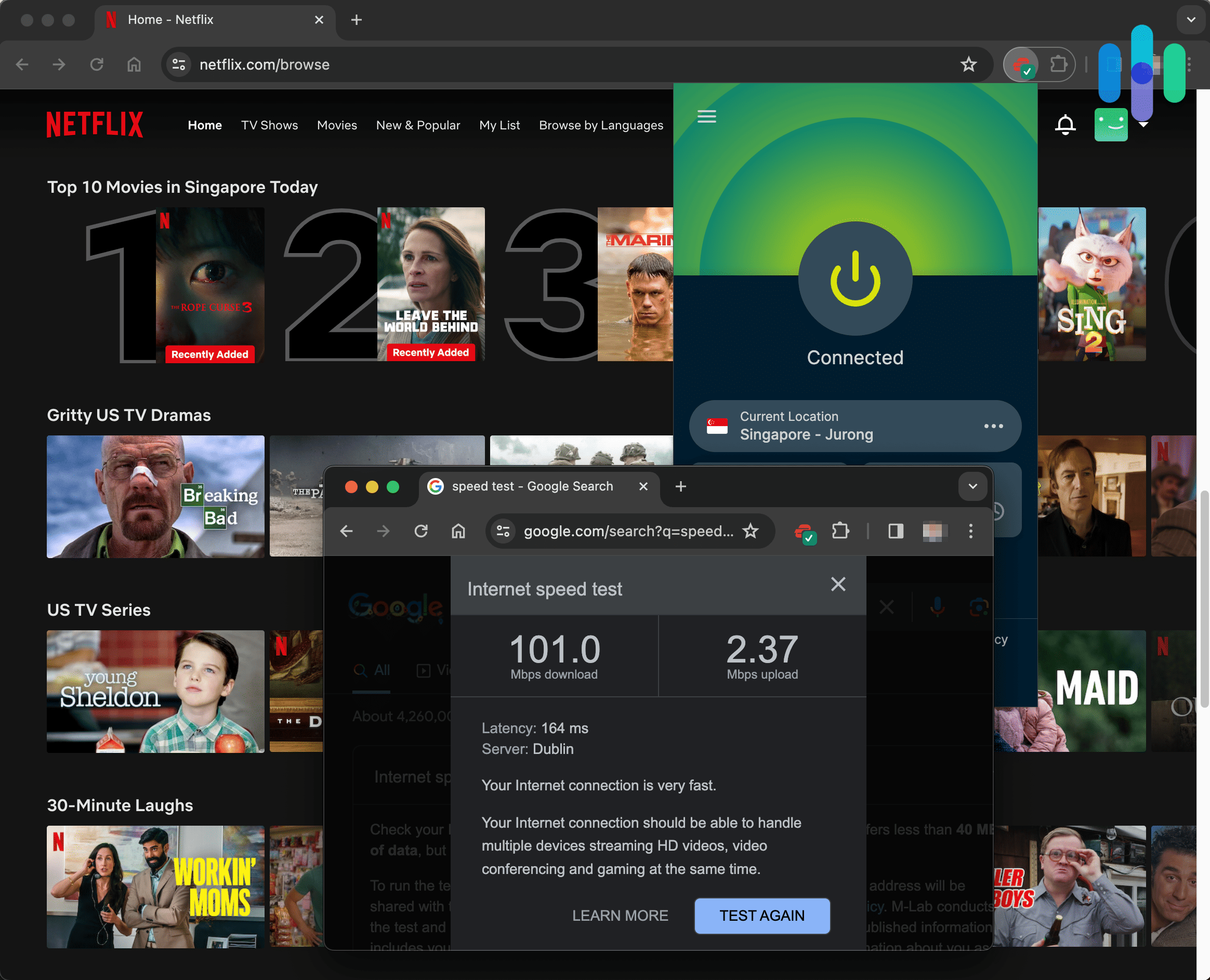
Keep in mind that internet speed is made up of several factors, including the time of day, location, internet service provider, software, hardware, and the VPN server. We tested ExpressVPN on a Macbook Air and a Windows Vivobook from our apartments in Brooklyn, New York. Without a VPN, we’re on an Optimum Wi-Fi network, typically.
Download Speed Tests
| Mac | |
|---|---|
| Without VPN | 37.05 mbps |
| With VPN | 22.7 mbps |
| Windows | |
|---|---|
| Without VPN | 62.88 mbps |
| With VPN | 39.77 mbps |
First, we measured the difference in download speed in megabits per second. As the above picture demonstrates, ExpressVPN had a very similar decrease in the download speeds on both the Mac and the Windows computers. The Mac’s download speed slowed by about 39 percent and the Windows speed slowed about 37 percent.
Upload Speed Tests
| Mac | |
|---|---|
| Without VPN | 25.9 mbps |
| With VPN | 22.19 mbps |
| Windows | |
|---|---|
| Without VPN | 40.61 mbps |
| With VPN | 30.95 mbps |
Next, we tested the difference in upload speeds with and without the VPN. Again, ExpressVPN performed well, but it did better on the Mac with a decrease of only about 14 percent compared to 23 percent on the Windows computer.
Ping Speed Tests
| Mac | |
|---|---|
| Without VPN | 14 mbps |
| With VPN | 20 mbps |
| Windows | |
|---|---|
| Without VPN | 14 mbps |
| With VPN | 19 mbps |
Finally, we tested the ping, or latency, in milliseconds. In this category, the Windows computer actually performed better than the Mac, but not by much, as you can see. Overall, we concluded that ExpressVPN worked really well on both Macs and Windows computers. We were perfectly content with our speeds.
DNS Leak Test
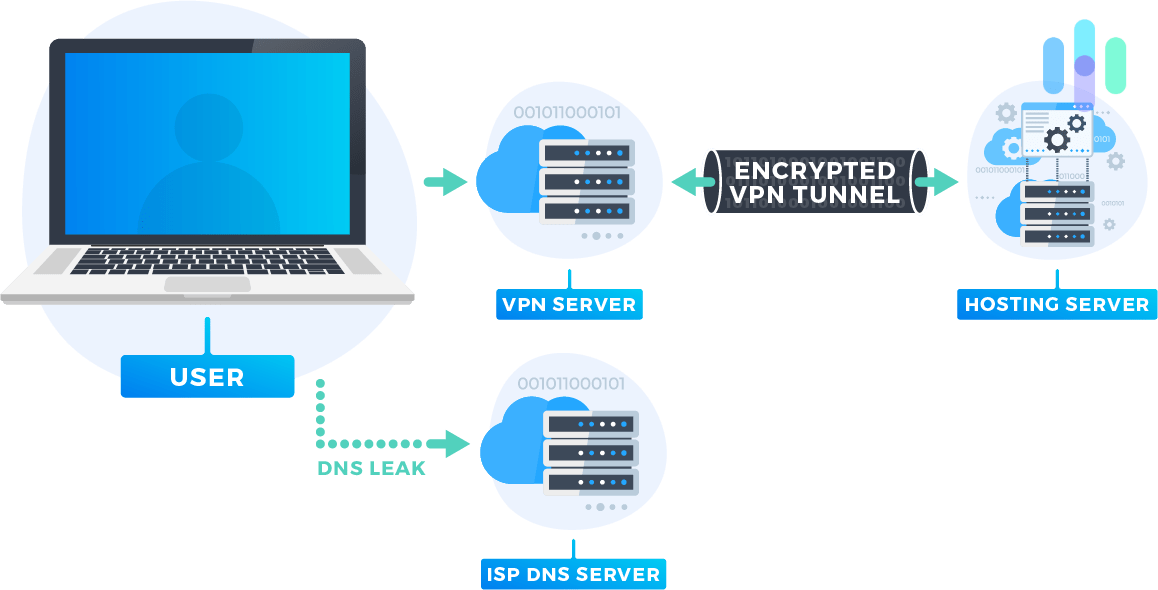
We always perform DNS leak tests because if it has a leak, a device could send DNS traffic outside of the VPN’s tunnel. Alternatively, it might use the VPN tunnel but connect to a third-party server. A leak can happen even if you configure your VPN manually if an attacker gets control of your router.
ExpressVPN has a DNS leak test on its website. All we had to do was turn our VPN on and click the button to look for leaks. In a matter of seconds, we had our answer.

As the above photo shows, our ExpressVPN server had no DNS leaks, definitely a good sign.
WebRTC Leak Test

WebRTC, otherwise known as Web Real-Time Communication, is a collection of standardized technologies that allow web browsers to communicate with each other directly. That means they don’t have to go through intermediate servers. WebRTC creates faster speeds, particularly for video chat, live streaming, and file transfers. Sounds great, right?
The possible security issue arises from the fact that WebRTC needs your private IP address.
ISPs, or internet service providers, issue public IP addresses. These addresses are globally unique, and your ISP can assign only one to each device, typically a router. Public IP addresses allow users to access the internet directly.
On the other hand, routers issue private IP addresses to each device in your network. Mostly, computers, smartphones, and tablets use them. A VPN issues you a unique private IP address so no one can track your online activity.
As WebRTC uses your private IP address, if you’re using a VPN, it’s important to test for WebRTC leaks. A leak could make your address available to prying eyes. Keep in mind that Firefox, Chrome, Opera, and Microsoft Edge all default to WebRTC.
Like DNS leaks, ExpressVPN has a WebRTC leak test on its website, and it’s incredibly easy to use. We made sure our VPN was turned on and clicked a button to detect leaks.
Blessedly, our ExpressVPN protected us from WebRTC leaks. We had a fast connection without risking the security of our private IP addresses.
ExpressVPN Video Review
We condensed our testing process and information about ExpressVPN’s features in this video review, so check it out if you want to see ExpressVPN in action.
ExpressVPN Subscriptions
Let’s cut to the chase. What does all this protection cost?
We had a choice, between one month, one year, or two years. Essentially, the monthly price gets lower as the term length increases. ExpressVPN offers a 30-day money-back guarantee, so we tried the VPN out without any real risk. We knew we could “return it” digitally for a full refund.
One thing to note is that ExpressVPN is not the cheapest VPN. All that protection costs a premium price relative to what other VPNs in the market provide. The lowest rate for ExpressVPN is about $5 per month for the two-year package, whereas there are lots of great options like Private Internet Access that offer protection for as low as $2.19 monthly.
Here’s ExpressVPN’s options.
Options
| Basic | Advanced | Pro | |
|---|---|---|---|
| Simultaneous connections | 10 | 12 | 14 |
| Advanced protection (ad blockers, malicious site blocker) | No | Yes | Yes |
| Password manager | Yes | Yes | Yes |
| Monthly cost | $3.49 | $4.49 | $7.49 |
| Billing amount | $97.72 | $125.72 | $209.72 |
The prices above are ExpressVPN’s two-year plans and include four months free. For 12 months, Basic is $4.99 per month, Advanced is $5.99 per month, and Pro is $8.99 per month. You only get three months free with these ExpressVPN plans.
How do these prices compare to other companies? NordVPN plans start from $3.09 per month for a two-year subscription. It’s billed annually at $83.43, so around $15 less than ExpressVPN. When it’s time to renew, NordVPN costs about $50 less than ExpressVPN per year.
Be sure to keep an eye on the simultaneous connections, though. With a subscription, you can install NordVPN and ExpressVPN on unlimited devices, but you can connect up to only 10 devices at a time with NordVPN regardless of which plan you’re using. With ExpressVPN, you can connect 10 to 14 devices, depending on your subscription.
With all of ExpressVPN’s subscriptions, we switched between an unlimited number of servers and maintained five connections at once. Had we needed more simultaneous connections, we could have bought an additional license or set up a VPN router to get an unlimited amount.
Manual Configurations
ExpressVPN works with Linux, Chromebook, wireless routers (Sabai, DD-WRT, Asus, or Tomato), and with several different streaming media and gaming consoles (Apple TV, FireTV, PlayStation, Nintendo Switch, or Xbox).
The setup process for those devices vary, but all in all, it doesn’t take much expertise to run ExpressVPN. Plus, with the Aircove router, you can opt to skip the complicated setup process and just buy a VPN hardware that protects all your home network traffic from the get-go.
Browser Extensions
We had the choice to enter an ExpressVPN server using Chrome, Firefox, or Edge.
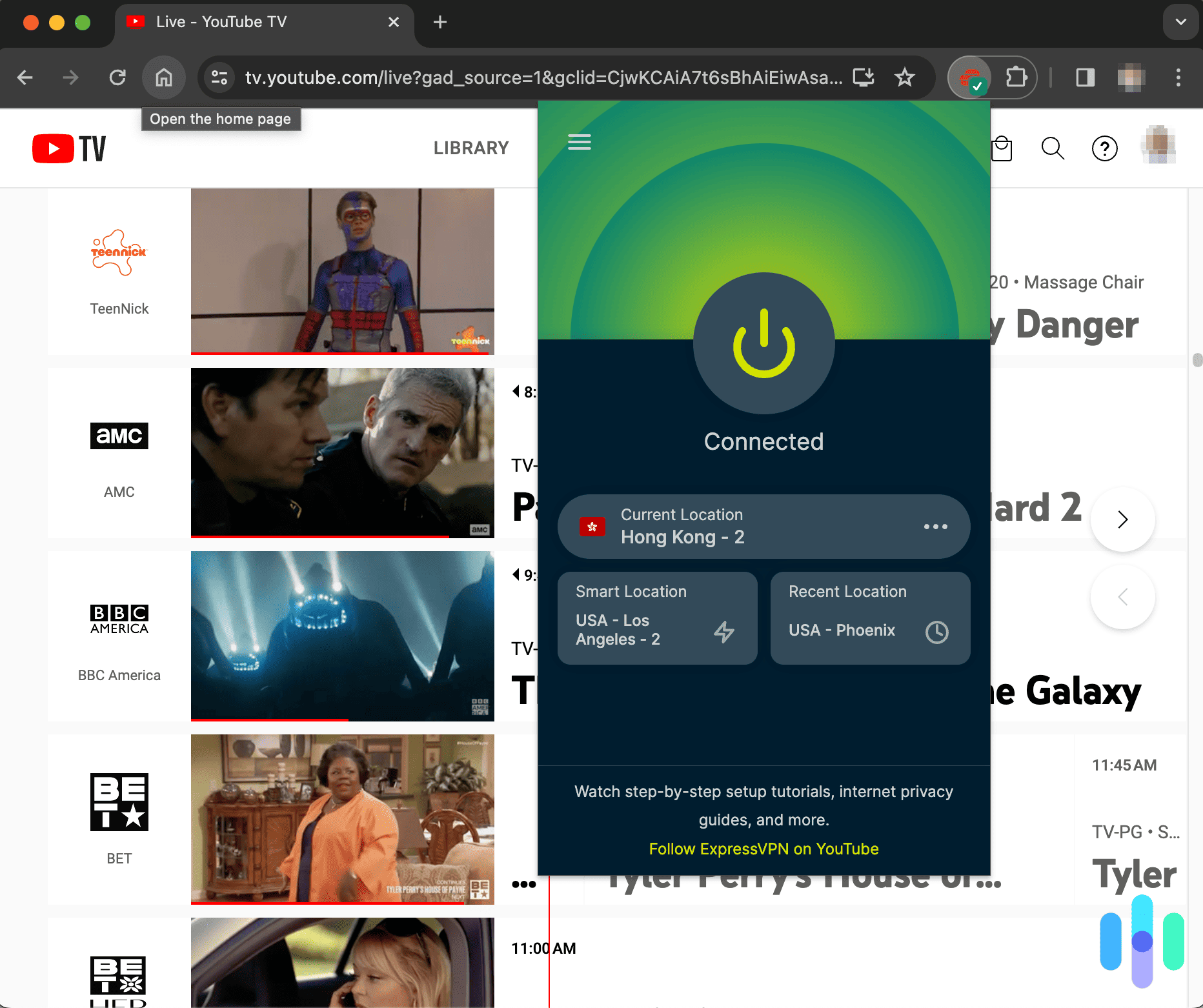
ExpressVPN Customer Support
When we ran into trouble with ExpressVPN, we were pleased to have access to a knowledgeable customer support team.
Features
ExpressVPN has 24/7 customer support through live chat and email. As millennials, these services were enough for us, despite the lack of a phone line. We also had the option to contact customer support through our ExpressVPN app directly, which should have made the whole experience seamless.
The ExpressVPN App
Of course, we always want a good app to connect with our VPN. Let’s talk about the ExpressVPN app: what it offers, where we used it, and just how well it worked.
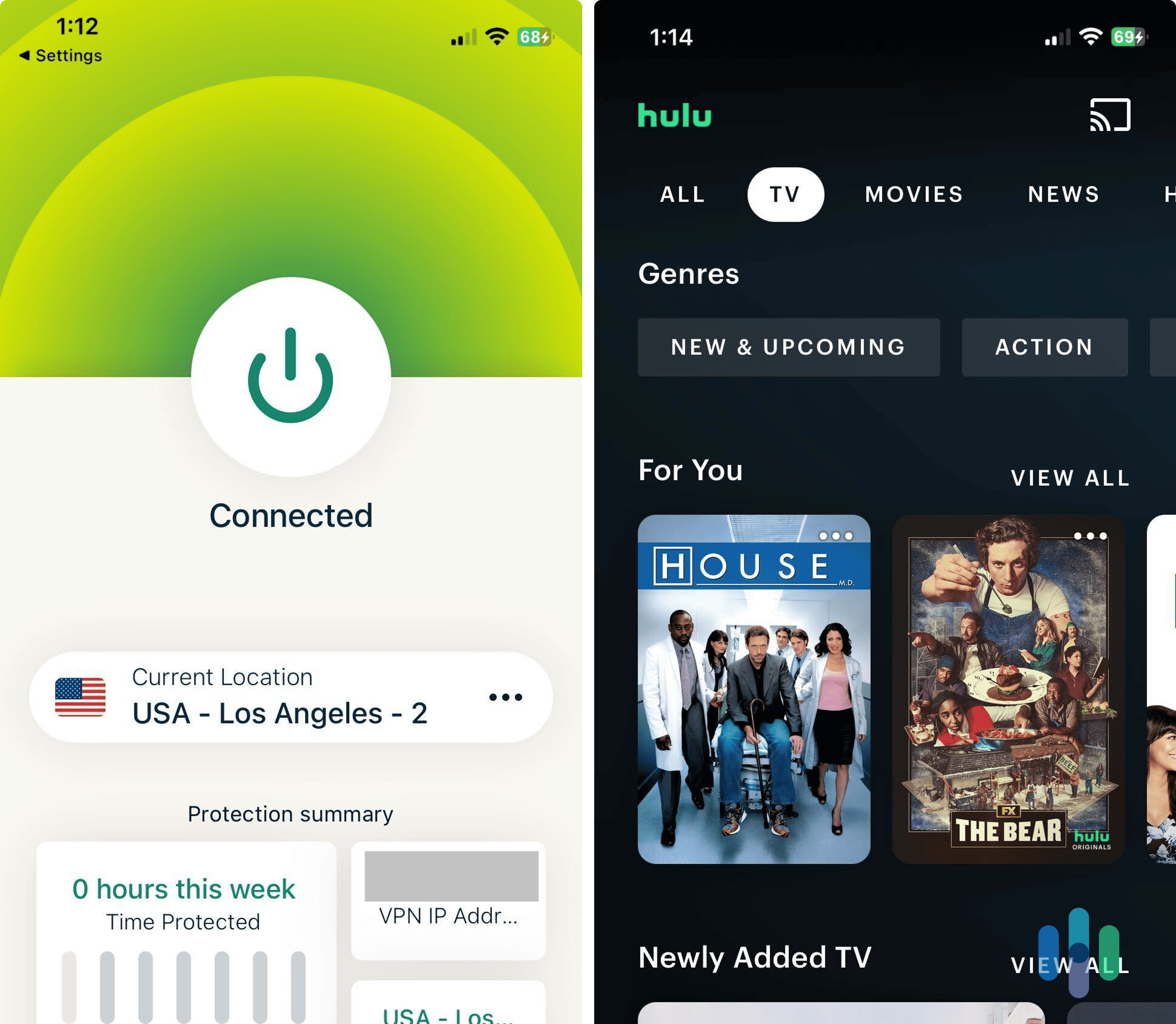
The ExpressVPN app supports the Windows, Mac, iOS, Android, Linux, Blackberry, routers, and Kindle operating systems. That’s already a long list, but as more operating systems add native VPN app support, ExpressVPNs apps keep growing as well. Just recently, for example, ExpressVPN launched an app for Apple TV, which is exclusively available to Apple TV users using the tvOS 17 system. That’s one reason ExpressVPN deserved a spot in our roundup of the best Apple TV VPNs.
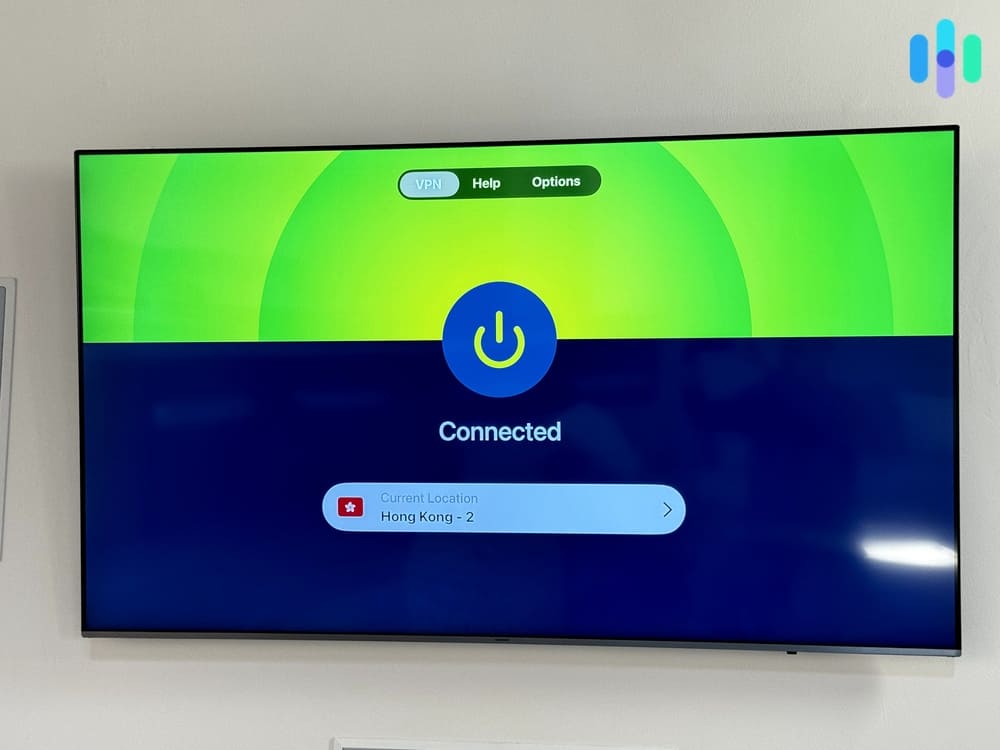
Even for the devices that don’t have native VPN app support, ExpressVPN offers Aircove as an alternative. Aircove doesn’t need an app to direct a device’s traffic to the VPN server – all you need to do is connect any device to its Wi-Fi or Ethernet network.
As for ourselves, we conducted most of our tests on iOS and Android devices. All in all, we were pretty happy with the ExpressVPN app. Others on the app store seem to be happy with it as well. It has a nearly perfect 4.6 rating from the Apple store and a decent 4.3 rating from the Google Play store.
“Very impressed with the new in-app shortcuts to navigate to favorite apps…I have noticed a significant improvement of the connection reliability,”
wrote Android user Bruno Perovic in a recent four-star review.
ExpressVPN Vs. NordVPN
NordVPN is another leading VPN with a lot of similarities to ExpressVPN. While ExpressVPN has over 2,000 servers in 160 countries, when we reviewed NordVPN we found that it has a whopping 5,246 in 62 countries. Make sure to check out its server locations before making your decision, though.
In addition, neither NordVPN or ExpressVPN is part of an international surveillance alliance or is subject to data retention laws, as they’re based in the British Virgin Islands and Panama, respectively.
Features Comparison
| Feature | ExpressVPN | NordVPN |
|---|---|---|
| Log Data | No | No |
| Kill Switch | Yes | Yes |
| Tunneling | Split | No |
| Netflix | Yes | Yes |
| Torrenting | Yes | Yes |
| IP Addresses | Anonymous, regularly rotated | Static, Shared with Other NordVPN Users |
Neither VPN logs data, including the time or duration of your session, IP addresses, servers used, files downloaded, and websites visited. Both have kill switches, an essential security feature, and we could stream from Netflix and download torrent files with both VPNs.
Unlike ExpressVPN, NordVPN does not offer split tunneling, so we couldn’t access private and public networks simultaneously. While both VPNs offer anonymous IP addresses, NordVPN gave us the same IP address each time, which wasn’t great for security. Sharing our IP address with other NordVPN users made us harder to trace.
If you want a dedicated IP address, you can buy one for a small fee. We prefer how ExpressVPN rotates its IP addresses regularly, as it makes it harder for hackers to track us.
Now that we’ve gone over how NordVPN and ExpressVPN’s features compare, let’s talk about their performances. While ExpressVPN worked better on our Windows computer speed-wise, NordVPN worked better on our Macs. Neither system had any DNS or WebRTC leaks.
Overall, these are both top choices for VPNs, but we’d recommend ExpressVPN to a Windows user and NordVPN to a Mac user.
Can ExpressVPN stand toe-to-toe with other brands? Find out below.
Wondering if ExpressVPN is right for you? We squared it up with the best systems available to help you make a smart decision.
>> For Further Insight: Best ExpressVPN Alternatives
Our ExpressVPN Research and Data
The following is the data and research conducted for this review by our industry-experts. Learn More.
Encryption
| In Transit | Yes |
|---|---|
| At rest? | Yes |
| All network communications and capabilities? | Yes |
Security Updates
| Automatic, regular software/ firmware updates? | No |
|---|---|
| Product available to use during updates? | No |
Passwords
| Mandatory password? | Yes |
|---|---|
| Two-Factor authentication? | No |
| Multi-Factor authentication? | No |
Vulnerability Management
| Point of contact for reporting vulnerabilities? | Bugcrowd or via email at security@expressvpn.com |
|---|---|
| Bug bounty program? | Yes |
Privacy Policy
| Link | https://www.expressvpn.com/privacy-policy |
|---|---|
| Specific to device? | No |
| Readable? | Yes |
| What data they log | Name, email address, and payment information name, email address, and payment information. App diagnostic data, which include crash reports, usability diagnostics, and VPN connection diagnostics, are anonymized and cannot be tied back to individual ExpressVPN users. Information related to which Apps and Apps version(s) you have activated. Whether you have successfully established a VPN connection on a particular day (but not a specific time of the day), to which VPN location (but not your assigned outgoing IP address), and from which country/ISP (but not your source IP address). Information regarding the total sum of data transferred by a given user. With your permission, we collect anonymized app diagnostic data, which include crash reports, usability diagnostics, and VPN connection diagnostics. |
| What data they don’t log | No data about the contents or destinations of VPN traffic, no DNS queries, and no IP addresses. |
| Can you delete your data? | Yes if european, must contact support |
| Third-party sharing policies | Users may opt out of third-party vendor use of cookies |
Surveillance
| Log camera device/ app footage | n/a |
|---|---|
| Log microphone device/ app | n/a |
| Location tracking device/ app | No |
Parental Controls
| Are there parental controls? | No |
|---|
Company History
| Any security breaches/ surveillance issues in past? | No |
|---|---|
| Did they do anything to fix it? | n/a |
Additional Security Features
| Anything like privacy shutters, privacy zones, etc.? | n/a |
|---|
Recap of ExpressVPN
Overall, we recommend ExpressVPN to our readers, as it’s very secure, performs well, and allows us to go on Netflix and torrent movies. But since everyone has their personal preferences, we’ll break it down even further.
We’d recommend ExpressVPN to anyone that wants a VPN based in a Five Eyes non-member country, with an extensive network of more than 2,000 servers worldwide. ExpressVPN is also a great choice for anyone that wants to watch Netflix or torrent content, and it performed well in our speed tests.
However, ExpressVPN may not be for you if you’d like multi-hop encryption, dedicated IP addresses, or unlimited simultaneous connections. Otherwise, ExpressVPN is the best VPN for a reason: it’s safe, it’s secure, and it won’t break the bank.
ExpressVPN FAQS
Our readers have a ton of questions about ExpressVPN, and we’ve answered the ones we get the most below.
-
Is ExpressVPN legit?
ExpressVPN is a legitimate VPN service. The company is based in the British Virgin Islands and has over 2,000 servers in 160 countries.
-
How much does ExpressVPN cost?
Normally, ExpressVPN costs $12.95 per month. If you sign up for a year or two-year plan, you have to pay for the entire length of the plan upfront, but get a per-month discount. Right now, the one-year plan costs $99.95 upfront, but comes with 3 free months for a per-month cost of $6.67. Likewise, the two-year plan costs $139.72 upfront, but it includes 4 free months for a per-month cost of $4.99.
-
Is ExpressVPN illegal?
In the United States, ExpressVPN is legal, as VPNs are legal here. However, not all countries allow for VPNs, so in some countries like Russia and China, ExpressVPN may be illegal.
-
Is ExpressVPN free?
ExpressVPN is not free. Rather, its monthly costs start at $6.67 if you sign up for a year. However, while ExpressVPN lacks a free version or trial, the company does offer a 30-day money-back guarantee. If you cancel before the first billing date, you can get your money refunded.
-
The Register. (2021). ExpressVPN bought for $1bn by Brit biz with an intriguing history in adware.
theregister.com/2021/09/14/expressvpn_bought_kape/ -
Reuters. (2021). ExpressVPN employees complain about ex-spy's top role at company.
reuters.com/technology/expressvpn-employees-complain-about-ex-spys-top-role-company-2021-09-23/ -
StatsUp (2025). Virtual Private Network (VPN) Statistics.

